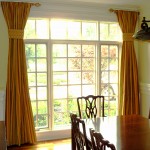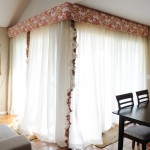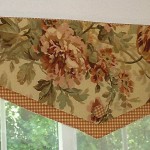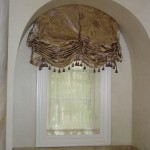Drapery lines define the physical space and can set the mood in a room. Vertical lines give the impression of steadiness and strength, dignity, formality and loftiness as well as simplicity. When overemphasized however they could have the look of stiffness and even sternness.
Horizontal lines imply relaxation and security. They express the idea of calmness, quietude and duration. When horizontal lines are used they tend to elongate, widen and emphasize a casual decorating scheme.
Straight lines both vertical and horizontal will include stripes, checks and plaids. These lines used in combination communicate stability and solidity.
Vertical lines are often used in a masculine room while a feminine room would have more curved lines.
Diagonal lines such as triangular and herringbone suggest movement and action. They are restless and dynamic. They suggest motion and change and give the feeling of instability.
Curved lines will promote softness and sensuality, they are lighthearted in appearance and have an effect of being cheerful. Deep curves on the other hand suggest confusion.
Window coverings are a great way to introduce lines into a room’s design. General architecture in a room tends to be square and/or rectangular such as rugs, walls, windows and furniture. Window treatments soften these features with swags, tieback draperies, curved valances and cornices. .
Symmetry adds balance and formality to windows and is generally pleasing and calming to the observer. Use symmetrical or asymmetrical treatments to create either a formal or a casual feeling. Symmetry simply means that when an arrangement is divided in half, each half is a mirror image of the other.


















by Susan Dorbeck